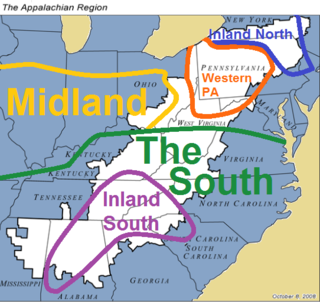
Back Æppalæcianisc Englisc ANG انگلیسی آپالاشیا FA Bahasa Inggris Appalachia ID Appalachian English SIMPLE Appalachen-Ängelsk STQ
This article has an unclear citation style. (April 2018) |
| Appalachian English | |
|---|---|
| Region | Southern United States, Appalachia |
| Ethnicity | Appalachians |
Early forms | |
| Language codes | |
| ISO 639-3 | – |
| Glottolog | appa1236 |
 Appalachia (in white) overlaid with dialect regions defined by the 2006 ANAE. Southern American English is the dominant dialect in the region. | |
Appalachian English is American English native to the Appalachian mountain region of the Eastern United States. Historically, the term Appalachian dialect refers to a local English variety of southern Appalachia, also known as Smoky Mountain English or Southern Mountain English in American linguistics.[1] This variety is both influential upon and influenced by the Southern U.S. regional dialect, which has become predominant in central and southern Appalachia today, while a Western Pennsylvania regional dialect has become predominant in northern Appalachia,[2] according to the 2006 Atlas of North American English (ANAE). The ANAE identifies the "Inland South", a dialect sub-region in which the Southern U.S. dialect's defining vowel shift is the most developed,[3] as centering squarely in southern Appalachia: namely, the cities of Knoxville and Chattanooga, Tennessee; Birmingham, Alabama; Greenville, South Carolina; and Asheville, North Carolina.[4] All Appalachian English is rhotic and characterized by distinct phonology, morphology, syntax, and lexicon. It is mostly oral but its features are also sometimes represented in literary works.
Extensive research has been conducted since the 1930s to determine the origin of the Appalachian dialect. One popular theory is that the dialect is a preserved remnant of 16th-century (or "Elizabethan") English in isolation,[5][6] though a far more accurate comparison would be to 18th-century (or "colonial") English.[7] Regardless, the Appalachian dialect studied within the last century, like most dialects, actually shows a mix of both older and newer features,[7] with particular Ulster Scots immigrant influences.[8]
Appalachian English has long been a popular stereotype of Appalachians and is criticized both inside and outside the speaking area as an inferior dialect, which is often mistakenly attributed to supposed laziness, lack of education, or the region's relative isolation. American writers throughout the 20th century have used the dialect as the chosen speech of uneducated and unsophisticated characters, though research has largely disproven these stereotypes; however, due to such prejudice, the use of the Appalachian dialect is still often an impediment to educational and social advancement.[9]
Along with these pejorative associations, there has been much debate as to whether Appalachian English constitutes a dialect separate from the American Southern regional dialect, as it shares many core components with it. Research reveals that Appalachian English also includes many grammatical components similar to those of the Midland regional dialect, as well as several unique grammatical, lexical, and phonological features of its own.[10]
- ^ Wells (1982), p. 527.
- ^ Labov, Ash & Boberg (2006), pp. 148, 150.
- ^ Labov, Ash & Boberg (2006), p. 254.
- ^ Labov, Ash & Boberg (2006), p. 129, 146, 256.
- ^ Montgomery (1995), pp. 17–18.
- ^ Cooper, Horton. "History of Avery County", Biltmore Press, (1964)
- ^ a b Montgomery (2004), p. 246.
- ^ Montgomery (2006), pp. 1000–1001.
- ^ Montgomery (2006), pp. 999–1001.
- ^ Wolfram, Walt 1941– (December 21, 2015). American English : dialects and variation. John Wiley & Sons. ISBN 9781118390221. OCLC 919068264.
{{cite book}}: CS1 maint: numeric names: authors list (link)